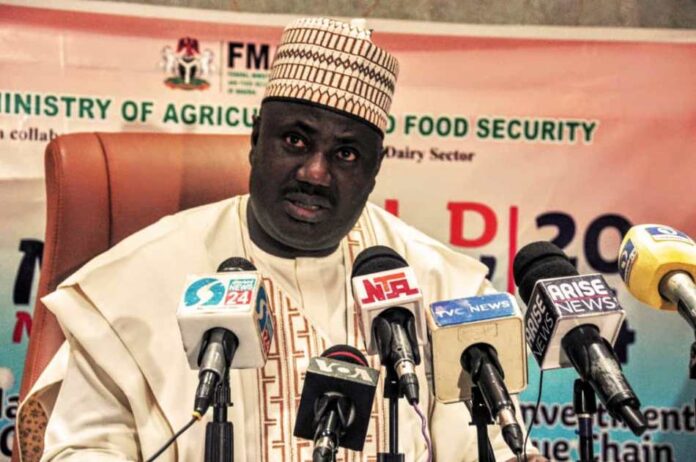
The Federal Ministry of Agriculture and Food Security, in collaboration with stakeholders in the dairy industry, has pledged to conclude arrangements to increase the country’s annual milk, meat, and poultry production by 10% annually.
Speaking during the press conference to commemorate 2024 World Milk Day with the theme: ‘Harnessing the Nutrition and Investment opportunities in the Dairy Value Chain’, held in Abuja recently, the Hon. Minister of State for Agriculture and Food Security, Dr. Aliyu Abdullahi, CON, stated that one of the government’s priority actions is that meat, dairy, eggs, fish and other protein from animal sources will receive special intervention to increase productivity target of annual growth rate of 10% year-on-year.
The Minister acknowledged the difficulty in attaining food and nutrition security without animal-source foods which provide the irreplaceable nutrients from animal protein sources (milk, meat, poultry, and fish products) required for growth and development, especially for children in Nigeria.
He said: “with an estimated 2 million children in Nigeria suffering from severe acute malnutrition (SAM) partly due to limited consumption of animal-source food, the role of milk consumption comes handy and to the rescue if made available.
“Indeed, the recent National Food Consumption and Micronutrient Survey 2021 clearly indicated the level of deficiency affecting women and children in which milk products play critical ameliorating roles.
Abdullahi, however, pointed out that the government is determined to urgently reverse the above trend, citing the Central Bank of Nigeria (CBN), the Minister noted that Nigeria spends $1.5 billion per annum to import dairy products, explaining that this is because of the country’s production deficit which stood at nearly 60% as Nigerians consumed an average of 1.6 billion litres of milk and its products.
He said: “The passionate dream of President Bola Ahmed Tinubu is for us to attain national production security to even lead to export of dairy products to African countries under the African Continental Free Trade Agreement (AfCFTA).
According to him, the stakeholders meeting will focus on the transformation of the Nigeria dairy value chain towards attaining food and nutrition security and delivering on the Renewed Hope Agenda of Food Security, Economic growth and job creation, poverty alleviation, inclusivity and contributing to security of local producers.
The Minister reiterated that it is in pursuance of this priority plan that speedy actions to transform the livestock sector especially the dairy value chain towards attaining food and nutrition security becomes not only imperative but an urgent national duty.
He said the National President of the Miyetti Allah Cattle Breeders Association of Nigeria (MACBAN) had called on the federal government to pay more attention to the dairy industry through budgetary allocation.
The livestock sector has not and never received the needed attention from the government; the only support we have gotten is vaccination of cows, he noted.
The Minster stated that lack of organized milk collection schemes, high cost of milk collection and cold chain facilities, poor transportation infrastructure, unstable or non-existent electricity supply, pervasive insecurity and low access to finance are some of the challenges that affect smooth operations in the midstream aspect of the dairy sector.
“Nigeria can only bridge its estimated annual $1.3 billion dairy import when the Federal Government provides the needed infrastructure to drive investment and help reduce cost of production, he said.
Similarly, during the Exhibition programme to mark the World Milk Day, the Hon. Minister also pointed out the essentials of the feed and fodder industry to the growth of the dairy industry.
He noted that the dairy industry was supportive of the Federal Government’s food and security programmes, adding that nutrition security would ensure that women, children, and families were milk secured.
Eremah Anthonia (Mrs.)
Chief Information Officer
For: Director Information



